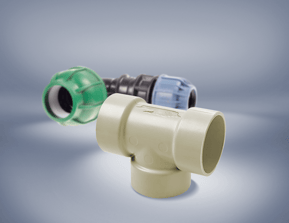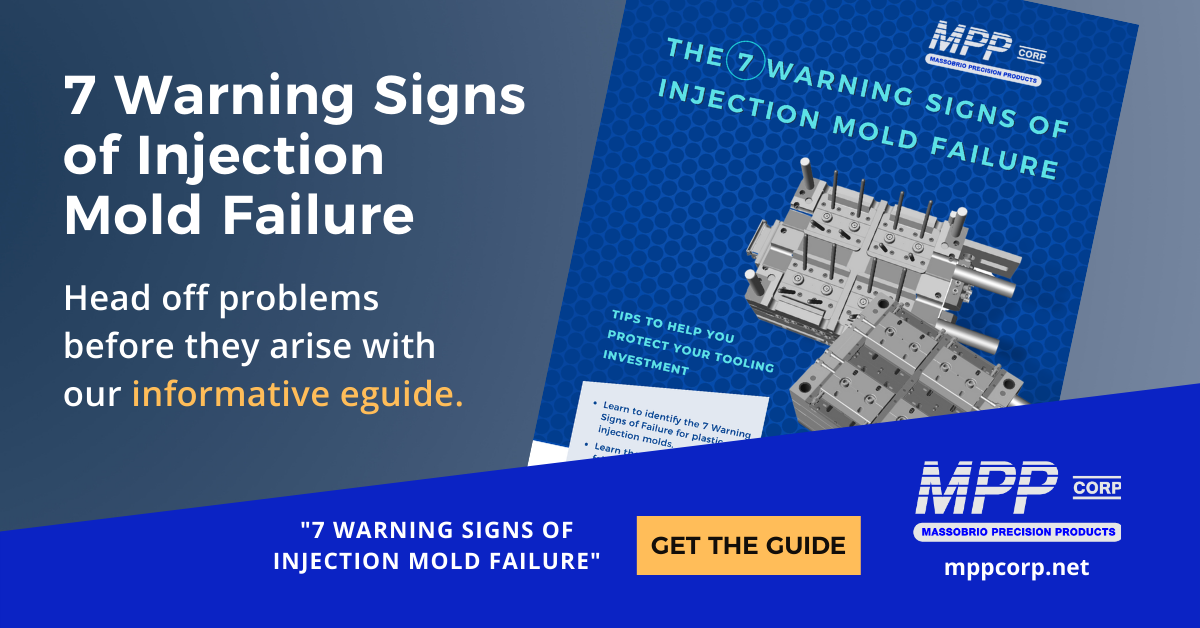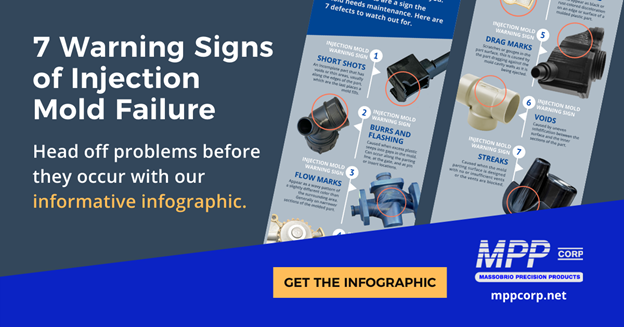You spend a lot of money on your plastic injection molds. Maintaining and repairing them can keep them running for years, providing a valuable return on your investment.
Short of a mold totally crashing, how do you know when a mold needs repair or maintenance? This article will tell you. We identify a plastic part defect that can be a sign of mold repair and maintenance. This article is part of a series discussing injection mold maintenance and repair.
Signs That Your Injection Mold Needs Repair or Maintenance
How do you know when a mold needs maintenance or repair? Short of a complete failure, here are the 7 tell-tale signs to look for in the parts that are produced by the mold.
- #1: Short shots where parts are ejected in an incomplete state
- #2: Burrs and flashing caused when excess plastic seeps into gaps in the mold
- #3: Flow marks caused by uneven injection speed or cooling
- #4: Blistering, stress cracks, and burn marks brought on by prolonged exposure to high temperatures
- #5: Drag marks caused by a misaligned ejector system
- #6: Voids or depressions from non-uniform heating or cooling of materials
- #7: Streaks
I this article, we discuss warning sign #6, Voids.
Injection Mold Warning Sign #6: Voids
 Voids are pockets of air trapped within or close to the surface of an injection molded part. Voids are often caused by uneven solidification between the surface and the inner sections of the part. This can be aggravated when the holding pressure is insufficient to condense the molten plastic in the mold. Voids can also develop from a part that is cast from a mold with two halves that are not correctly aligned.
Voids are pockets of air trapped within or close to the surface of an injection molded part. Voids are often caused by uneven solidification between the surface and the inner sections of the part. This can be aggravated when the holding pressure is insufficient to condense the molten plastic in the mold. Voids can also develop from a part that is cast from a mold with two halves that are not correctly aligned.
Voids may be considered a type of short shot because they are areas where material did not fill in the entire mold. However, voids are the product of air pockets and are not always visible. Rather, they may occur within the walls of the part, and depending on the size, number, and location of the voids, a part’s integrity may be compromised.
Remedies for eliminating voids include:
- Locate the gate at the thickest part of the molding
- Switch to a less viscous plastic. This will ensure that less gas is trapped as air is able to escape more rapidly
- Increase holding pressure as well as holding time
- Ensure that mold parts are perfectly aligned
Choose an Injection Mold Maintenance and Repair Partner You Can Trust
Why choose MPP? When you choose MPP, you get:
- A team of mold builders who have a combined 100+ years of mold building experience
- Expert knowledge of plastics and manufacturing processes
- In-house engineering and design services from experienced engineers
- In-house repair and maintenance from skilled mold builders, welders and machine operators
- A Quality Assurance system that meets all requirements of the ISO 9001:2008 Quality Assurance Standard
- Pickup and delivery from anywhere, anytime
- Personalized solutions
To discover how we can help you, call 810.364.2939 or contact us.



